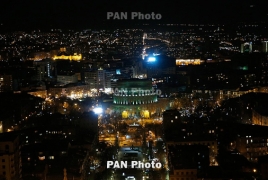Ignatius: West's involvement could help Armenia dodge coercive peace May 12, 2022 - 19:20 AMT PanARMENIAN.Net - Armenia’s best protection against a coercive peace would be participation by the United States and Europe in the negotiating process with Azerbaijan, American journalist David Ignatius says in a fresh article published by the Washington Post. The negotiations are controversial in Armenia, which was battered by Azerbaijan in a bloody 2020 war over the disputed territory of Nagorno-Karabakh and still bears deep emotional scars from the 1915 Genocide under the Ottoman Empire. Protesters in Yerevan have denounced Prime Minister Nikol Pashinyan’s opening to Baku and Ankara and have called for his resignation. "Armenian critics argue that Pashinyan is negotiating from weakness and is under pressure from Russia, which brokered a cease-fire in the 2020 war and then a meeting between Pashinyan and Azerbaijan President Ilham Aliyev last November. Certainly, Russian President Vladimir Putin is a self-interested and unreliable mediator. Armenia is still reeling from a war that cost thousands of lives and traumatized the country," Ignatius says. "Armenia’s best protection against a coercive peace would be participation by the United States and Europe in the negotiating process. One pathway for such a joint effort would a revival of the so-called Minsk Group, co-chaired by the United States, France and Russia. But Moscow is boycotting the group. Instead, the European Union has joined Russia as a co-sponsor of the talks, hosting a Pashinyan-Aliyev meeting in Brussels last month. That provides a Western leg of support for normalization." The journalist believes the most intriguing but also precarious player in this diplomatic round is Pashinyan. "Pashinyan, though dependent on Russia for military protection, shares the United States’ concern about the invasion of Ukraine — and he wants U.S. economic and diplomatic support. One sign was his insistence that Armenia join the U.S.-sponsored “Summit for Democracy,” which took place virtually in December, despite Russia’s strong opposition to its presence," he writes. "Armenia has a problem that Ukrainians may eventually have to confront. After suffering so much in battle, how can a nation make peace with countries that have caused so much pain and suffering? It’s an age-old problem, especially for a nation like Armenia that has experienced genocide. Blessed are the peacemakers, even if they’re not very popular right now in a still-grieving Yerevan." The foreign ministers of Armenia and Azerbaijan, Ararat Mirzoyan and Jeyhun Bayramov, have arrived in Washington. The CSTO budget for the current year requires adjustments due to the refusal of Yerevan to pay their share of contributions. Six total incidents have burned 19 old-growth trees. Friday night 8 trees were torched along the beautiful main entrance. The EU does not intend to conduct military exercises with Armenia, Lead Spokesperson for EU Foreign Affairs and Security Policy Peter Stano says. Partner news |